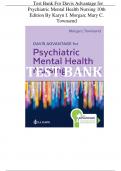Exam (elaborations)
TTest Bank For Davis Advantage for Psychiatric Mental Health Nursing 10th Edition By Karyn I. Morgan; Mary C. Townsend
Course
Davis advantage for psychiatric mental health
Institution
Davis Advantage For Psychiatric Mental Health
TTest Bank For Davis Advantage for Psychiatric Mental Health Nursing 10th Edition By Karyn I. Morgan; Mary C. Townsend
[Show more]
Preview 4 out of 1022 pages
Uploaded on
July 16, 2024
Number of pages
1022
Written in
2023/2024
Type
Exam (elaborations)
Contains
Questions & answers
Institution
Davis advantage for psychiatric mental health
Course
Davis advantage for psychiatric mental health
$13.49
100% satisfaction guarantee
Immediately available after payment
Both online and in PDF
No strings attached
TEST BANK TTest Bank For Davis Advantage for Psychiatric Mental Health Nursing 10th Edition By Karyn I. Morgan; Mary C. Townsend Table IIof IIContents I. BASIC IICONCEPTS IIIN IIPSYCHIATRIC -MENTAL IIHEALTH IINURSING 1. The IIConcept IIof IIStress IIAdaptation 2. Mental IIHealth IIand IIMental IIIllness: IIHistorical IIand IITheoretical IIConcepts II. FOUNDATIONS IIFOR IIPSYCHIATRIC -MENTAL IIHEALTH IINURSING 3. Concepts IIof IIPsychobiology 4. Psychopharmacology 5. Ethical IIand IILegal IIIssues III. THERAP EUTIC IIAPPROACHES IIIN IIPSYCHIATRIC IINURSING IICARE 6. Relationship IIDevelopment 7. Therapeutic IICommunication 8. The IINursing IIProcess IIin IIPsychiatric -Mental IIHealth IINursing 9. Therapeutic IIGroups 10. Intervention IIwith IIFamilies 11. Milieu IITherapy —The IITherapeutic IICommunity 12. Crisis IIIntervention 13. Assertiveness IITraining 14. Promoting IISelf IIEsteem 15. Anger IIand IIAggression IIManagement 16. Suicide IIPrevention 17. Behavior IITherapy 18. Cognitive IIBehavioral IITherapy 19. Electroconvulsive IITherapy 20. The IIRecovery IIModel IV. NURSING IICARE IIOF IIPATIENTS IIWITH IIALTERATIONS IIIN IIPSYCHOSOCIAL IIADAPTATION 21. Caring IIfor IIPatients IIwith IIMental IIIllness IIand IISubstance IIUse IIDisorders IIin IIGeneral IIPractice IISettings 22. Neurocognitive IIDisorders 23. Substance -Related IIand IIAddictive IIDisorders 24. Schizophrenia IISpectrum IIand IIOther IIPsychotic IIDisorders 25. Depressive IIDisorders 26. Bipolar IIand IIRelated IIDisorders 27. Anxiety, IIObsessive -Compulsive, IIand IIRelated IIDisorders 28. Trauma IIand IIStressor -Related IIDisorders 29. Somatic IISymptom IIand IIDissociative IIDisorders 30. Eating IIDisorders 31. Personality IIDisorders V. PSYCHIATRIC/MENTAL IIHEALTH IINURSING IIOF IISPECIAL IIPOPULATIONS 32. Children IIand IIAdolescents 33. The IIAging IIIndividual 34. Survivors IIof IIAbuse IIor IINeglect 35. Comm unity IIMental IIHealth IINursing 36. The IIBereaved IIIndividual 37. Military IIFamilies eBook IIBonus IIChapters 38. Theoretical IIModels IIof IIPersonality IIDevelopment 39. Cultural IIand IISpiritual IIConcepts IIRelevant IIto IIPsychiatric IIMental IIHealth IINursing 40. Complementary IIand IIPsychosocial IITherapies 41. Relaxation IITherapy 42. Issues IIRelated IIto IIHuman IISexuality IIand IIGender IIDysphoria 43. Forensic IINursing Chapter II1. IIThe IIConcept IIof IIStress IIAdaptation MULTIPLE IICHOICE 1. A IIclient IIhas IIexperienced IIthe IIdeath IIof IIa IIclose IIfamily IImember IIand IIat IIthe IIsame IItimebecomes unemployed. IIThe IIclient’s II6-month IIscore IIon IIthe IIRecent IILife IIChanges IIQuestionnaire IIis II110. IIThe IInurse: Understands IIthe IIclient IIis IIat IIrisk IIfor IIsignificant IIstress -related IIillness. IIDetermines IIthe IIclient IIis IInot IIat IIrisk IIfor IIsignificant IIstress -related IIillness. Needs IIfurther IIassessment IIof IIthe IIclient’s IIcoping IIskills IIto IIdetermine IIsuscept ibility IItostress -related IIillness. Recognizes IIthe IIclient IImay IIview IIthe IIlosses IIas IIchallenges IIand IIperceive IIthem IIasopportunities. ANS: II3 Chapter: IIChapter II1, IIThe IIConcept IIof IIStress IIAdaptation Objective: IIExplain IIthe IIrelationship IIbetween IIstress IIand IIdiseases IIof IIadaptation.Page: II5 Heading: IIStress IIas IIan IIEnvironmental IIEvent IIIntegrated IIProcesses: IINursing IIProcess: IIEvaluationClient IINeed: IIPsychosocial IIIntegrity Cognitive IILevel: IIApplication II[Applying]Concept: IIStress IIDifficulty: IIModerate Feedback 1. This IIis IIincorrect. IIAssessment IIis IIthe IIfirst IIstep IIof IIthe IInursing IIprocess. IIThe IInurse IIshould IIassess IIthe IIclient’s IIcoping IIskills IIand IIavailabl e IIsupport IIbefore IIdetermining IIsusceptibility IIto IIstress -related IIphysical IIand IIpsychological IIillnesses. IIThe IIRecent IILifeChanges IIQuestionnaire IIis IIan IIexpanded IIversion IIof IIthe IISchedule IIof IIRecent IIExperienc es IIand IIthe IIRahe -Holmes IISocial IIReadjustment IIRating IIScale. IIA II6-month IIscore IIof II300 IIor IImore IIor IIa IIyear-score IItotal IIof II500 IIor IImore IIindicates IIhigh IIstress IIin IIa client’s IIlife IIand IIsusceptibility IIto IIstress -related IIillnesses. 2. This IIis IIincorrect. IIAssessment IIis IIthe IIfirst IIstep IIin IIthe IInursing IIprocess. IIThe IInurse IIshould IIassess IIthe IIclient’s IIcoping IIskills IIand IIavailable IIsupport IIbefore IIdetermining IIthe IIclient’s IIperception IIof IIthe IIcurrent IIstresses. IIA II6-month IIscore IIof II300 IIor IImore IIor IIa IIyear-





